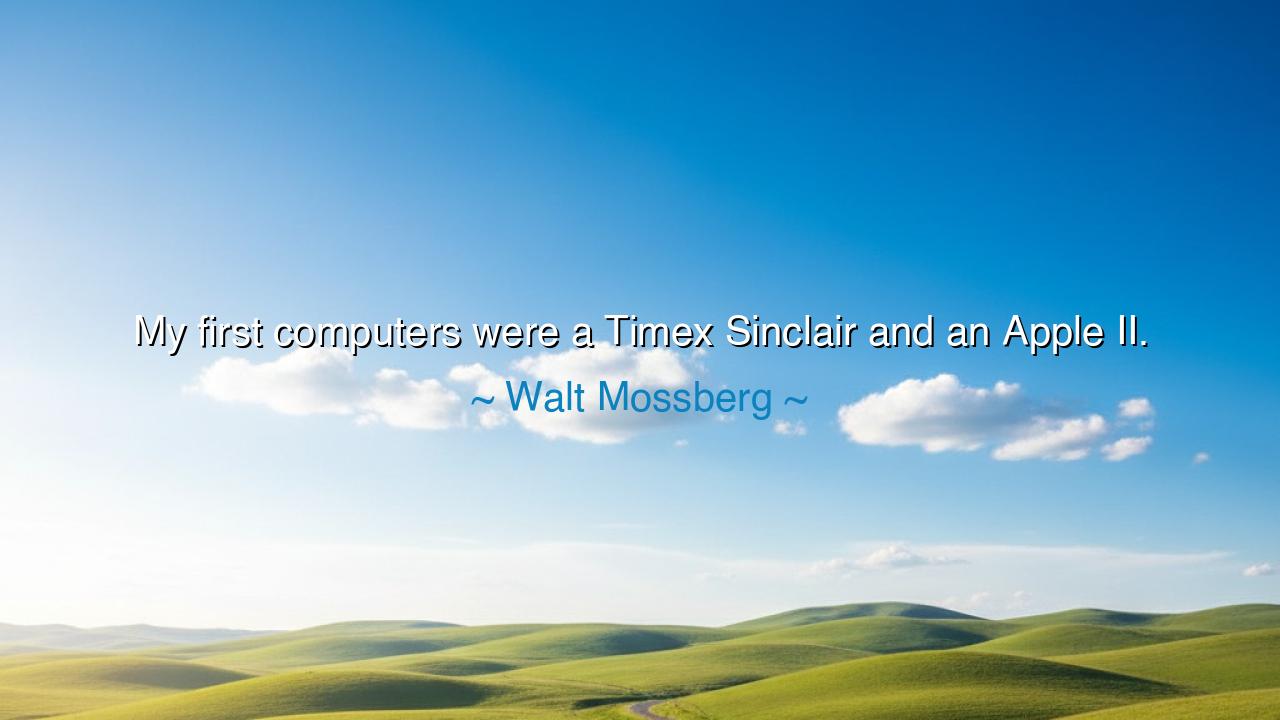
My first computers were a Timex Sinclair and an Apple II.






When Walt Mossberg said, “My first computers were a Timex Sinclair and an Apple II,” his words may seem simple — a recollection of humble beginnings in the age of machines. Yet within them lies the origin story of an era, the dawn of personal computing, when wonder was still raw and every flicker of a pixel felt like magic. These are not just machines he names, but symbols — the Timex Sinclair, small and limited, and the Apple II, a spark of human creativity that would ignite a revolution. Through them, Mossberg speaks of beginnings — not just his own, but of a generation that first learned to speak the language of the future.
In the days of the ancients, the philosopher might sit beneath the olive tree, gazing at the stars to understand the heavens. In Mossberg’s time, that same curiosity found its reflection in glowing screens and code — the new constellations of the modern world. The Timex Sinclair, crude by today’s measures, was a modest marvel: a tiny gateway to computation, memory measured in kilobytes, yet holding infinite possibility. It was not the power of the machine that mattered, but the awakening of imagination it stirred in those who touched it. So too with the Apple II, a device that brought the hidden language of circuits into homes, that transformed the cold precision of technology into something warm, human, and creative.
Mossberg’s words carry the spirit of the pioneer — one who stood at the threshold of a new world, uncertain yet full of promise. In the early 1980s, computers were not the seamless companions they are today; they were enigmatic and stubborn, demanding patience and curiosity. To own one was to become an explorer, charting a digital wilderness with blinking cursors as stars and syntax errors as storms. Those who persevered, as Mossberg did, were not merely users of machines — they were the first dreamers of the digital age, shaping the world we now inhabit.
The tale mirrors that of Gutenberg’s printing press, centuries before. When the first press groaned to life, it too was primitive, fragile, and misunderstood. Yet it changed the course of human knowledge, breaking the chains of scarcity and allowing ideas to spread like wildfire. So it was with those first personal computers. The Apple II, like the press, gave ordinary people access to extraordinary power — the power to create, to communicate, to learn. And Mossberg, who would later become one of the most respected voices in technology journalism, began his journey not as an oracle, but as a curious mind before two humble machines.
But his quote is not only about the history of devices; it is about the importance of beginnings. The wise have always taught that greatness grows from simplicity. The farmer begins with a single seed; the scholar, with a single word; the innovator, with a single machine that barely works but sparks endless ideas. Mossberg’s reverence for his early computers reminds us that the first steps — however small, however clumsy — are sacred. They are the fires that light the path ahead.
There is also a quiet gratitude in his words, a recognition that progress is born from patience. The youth of today, who hold in their hands machines more powerful than all the computers of that early age combined, often forget that their ease was purchased by the toil of pioneers who struggled with slow processors and fragile hardware. Mossberg’s remembrance is a call to humility: to honor those beginnings, to remember that even the simplest tools, when approached with curiosity, can change the course of destiny.
So the lesson is clear — cherish your firsts, whatever they may be. The first tools you hold, the first attempts that fail, the first spark of curiosity that compels you to explore — these are not trivial moments, but the foundations of mastery. Like Mossberg with his Timex Sinclair and Apple II, nurture your wonder. Be unafraid of imperfection. For every great journey begins not with perfection, but with passion and persistence.
Thus, from the wisdom of his memory, we learn that the greatness of technology — and of life itself — lies not in the speed of progress, but in the spirit of discovery. The first computer, the first idea, the first act of courage — each is a dawn. And those who greet the dawn with open eyes and an eager heart become, as Mossberg did, not mere witnesses of history, but its shapers.






AAdministratorAdministrator
Welcome, honored guests. Please leave a comment, we will respond soon